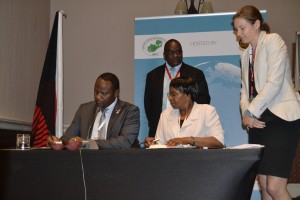LIVINGSTONE SYMPOSIUM
Effective research and innovation partnerships are an increasingly strategic component in the internalization of the agenda of nations and regions, according to the African Union’s Agenda 2063 and its Science, Technology and Innovation Strategy (STISA 24) which also encourages strategic partnerships and collaborations within the region and beyond.
 In this regard, the National Commission for Science and Technology (NCST) of Malawi and the National Science and Technology Council (NSTC) of Zambia co-hosted this year’s Global Research Council (GRC) Africa regional meeting and the Science Granting Council’s (SGCI) in Sub-Saharan Annual Forum and Monitoring and Evaluation and Learning (MEL) workshop from 20th to 24th November at the Avani Victoria Falls Hotel, in Livingstone, Zambia.
In this regard, the National Commission for Science and Technology (NCST) of Malawi and the National Science and Technology Council (NSTC) of Zambia co-hosted this year’s Global Research Council (GRC) Africa regional meeting and the Science Granting Council’s (SGCI) in Sub-Saharan Annual Forum and Monitoring and Evaluation and Learning (MEL) workshop from 20th to 24th November at the Avani Victoria Falls Hotel, in Livingstone, Zambia.
The GRC is a virtual organization comprising heads of science and engineering funding agencies from around the world, dedicated to promoting the sharing of data and best practices for high quality collaboration among funding agencies worldwide. The GRC seeks to improve communication and cooperation among funding agencies worldwide, promote the sharing of data and best practices for high quality research cooperation and provides a forum for regular meetings of the heads of research councils as they respond to opportunities and address issues of common concern in the support of research and education. Among other things, they also take the opportunity to broker strategic, direct alliances and engagements, as they contribute to the collective shaping of principles on effective and efficient implementation of national mandates in an increasingly trans boundary world.
Primarily, the SGCI aims to strengthen the capacities of SGCs in Sub Saharan Africa to support research and evidence based policies that will contribute to economic and social development. This initiative is supported through a joint partnership of the DFID, IDRC and NRF
Alongside the GRC forum, was also a Researcher’s Symposium on Animal and Livestock Sciences which was held from the 23rd to the 24th November in collaboration with the German Research Foundation (DFG), South Africa’s National Research Foundation (NRF) and Clarivate Analytics. The researcher’s symposium was a crucial component of this meeting considering the importance of agriculture to Africa’s economic development in providing food; employment and the much needed foreign investment through exports of commodities and finally packaged products; while at the same time, contributing to Africa’s climate change risk management.
NCST sponsored three Malawian animal livestock scientists namely: Prof. Timothy Gondwe, Dr. Fanny Chigwa from Lilongwe University of Agriculture and Natural Resources (LUANAR) and Dr. Ng’oma from Karonga ADD to present their research findings at the Symposium.
Kick-starting the weeklong activities on Monday, the 20th November was a march held to commemorate the World Science Day for Peace and Development. The march started from Mikuni Park to the one stop Tourism Centre in Livingstone and was graced by the Zambian Higher Education Minister, Professor Nkandu Luo.
Dignitaries from Malawi who attended the function were the Principal Secretary to the Ministry of Education, Science and Technology, Mr. Justin Adack K Saidi and the Malawi High Commissioner to Zambia and permanent representative to COMESA, Mr Warren Bamus Gunda. The guest of honour, Professor Nkandu Luo hailed the two science councils for their collaboration in organizing these events and indicated that this is a very welcome development within neighboring countries and should be encouraged.
The global partnerships enhanced at this just ended forum, created their own climate of opportunities where researchers got in contact with each other and also learnt of the different methodologies, approaches and new ideas in the hope of creating new insights and real scientific breakthroughs.
Taking a break from the arduous activities of the week, the participants enjoyed the picturesque view of the magnificent Victoria Falls. The venue proved to be the perfect space for the great minds to refresh after heavy and serious discussions that ensued during the weeklong event.